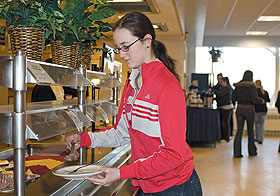  |
| HOME | THIS ISSUE | CALENDAR | GRANTS | BACK ISSUES | < BACK | NEXT > |
Dining hall experiment reduces waste by Ashley Sporleder - March 31, 2008 | ||||
| For many college students, the dining hall routine is a way of life. They swipe their cards, grab their trays, and voila: instant access to an all-you-can eat buffet. With a wide range of choices at their fingertips, they pile food onto their trays, much of which ends up in the trash when they realize they didn’t need that third slice of pizza, or fourth chocolate chip cookie. Concerned about waste, UConn Dining Services and the Office of Environmental Policy teamed up to conduct a three-week experiment earlier this semester, to determine whether eliminating trays from dining halls would help. The experiment was conducted in Whitney Dining Hall, the smallest on campus and the easiest to monitor, says Susan O’Keefe, manager of Whitney. “Whitney is the local and sustainable dining hall on campus,” she says, “so we are very socially involved in where our food is grown and produced.” The experiment consisted of three week-long phases. The first week served as the control phase, and involved monitoring the solid food waste left on trays during dinner, excluding napkins and beverages. Staff collected the waste in a separate container so that at the end of the night, it could be weighed and recorded. The number of times the dish washing machine needed to be operated during the meal period was also recorded, as another goal of the program was to use less water and electricity by running the dish washer less often. The monitoring continued throughout the three-week experiment. During the second phase, trays were removed on Monday night, but brought back for the rest of the week to make students aware of the experiment. Posters with information about food waste in the U.S. were placed in highly visible areas, and table tents – informational cards placed on dining tables – were set up to educate students.
For the third phase, trays were removed for the entire week, and additional educational material was offered, including napkin holders that displayed information about the amount of food that is wasted each year and the quantity of methane gas produced in landfills. O’Keefe says the lack of trays led to increased student attendance. “If anything we had more students come to Whitney and eat,” she says. “I guess they wanted to check the program out.” So was the experiment prove successful? “We did in fact have less waste during the weeks we did not use the trays,” O’Keefe says. On average, tray-less dinners reduced the total amount of waste by 19 percent and the amount of waste per person by 30 percent. There is also evidence of substantial water and energy savings, as the number of dish racks passed through the dishwasher machines decreased from 702 during phase 1, to 536 during phase 3, according to data reported by The Daily Campus. Although Whitney is still using trays for each meal, administrators are discussing the possibility of expanding the initiative campus-wide, in light of the positive response from those involved, especially students. “The majority of the students were interested in the waste reduction program,” says O’Keefe. “They were more than happy to go without using a tray, if it meant encouraging less waste.” |
| ADVANCE HOME UCONN HOME |

